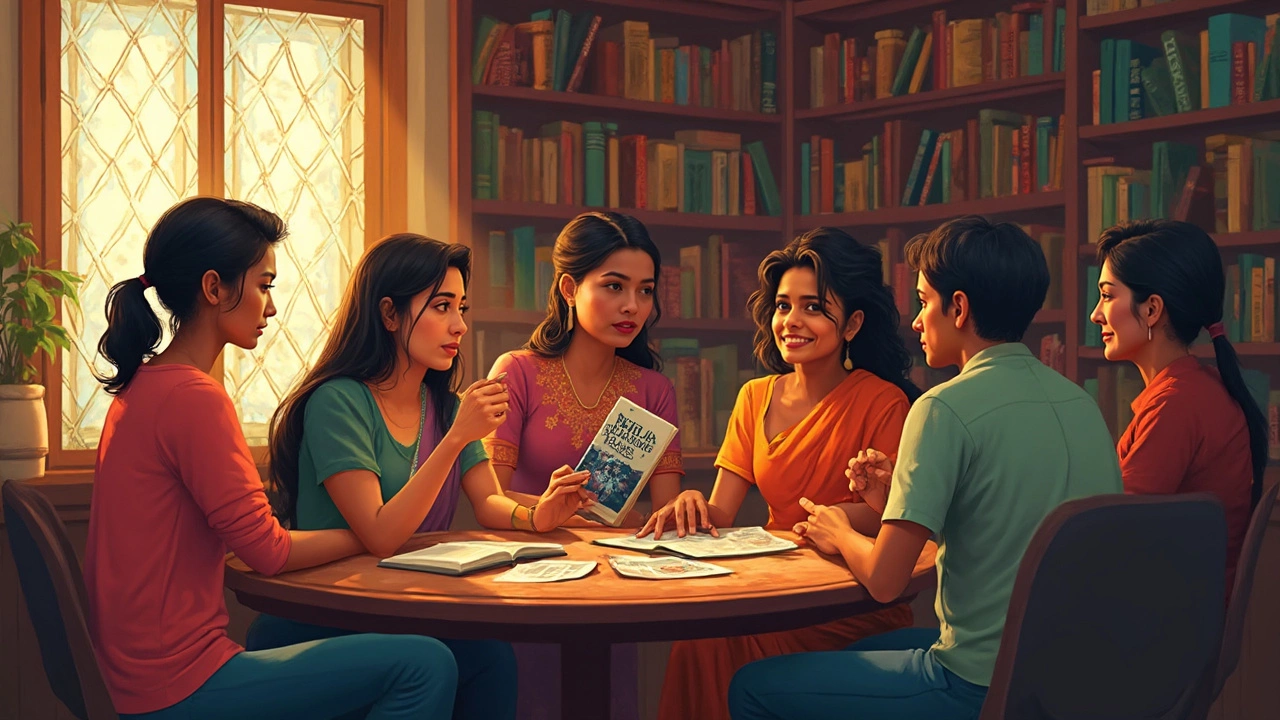How Is Literary Fiction Different? Your Guide to What Sets It Apart
 Jun, 8 2025
Jun, 8 2025
Pick up a literary fiction book and it’s almost like tuning into a different frequency. People always talk about this genre as if it’s some secret society, but honestly? The main difference is how it treats the story. Forget wild plot twists, explosions, and formula endings—here, it’s all about digging deep into characters, soaking up every line, and facing the stuff people don’t usually say out loud.
If you’re just starting with literary fiction, you might notice the story moves a little slower. That’s on purpose. These books want you to really get to know the people inside them—their struggles, weird habits, and odd ways of looking at the world. Even if nothing “big” happens on the outside, the real action is in the tiny details and the emotional gut punches that come out of nowhere.
For anyone who feels lost or bored with the classics, here’s a key tip: don’t look for page-turning plot points; look for sentences or moments that make you pause and think. That’s where literary fiction shows its magic. Stick around, and you’ll see how word choice, deeper themes, and that focus on character make all the difference.
- What Is Literary Fiction, Anyway?
- Character over Plot: The Big Switch
- Language and Style: Why Words Matter
- Themes That Hit Home
- Tips for Reading (and Enjoying) Literary Fiction
What Is Literary Fiction, Anyway?
When people toss around the term literary fiction, they’re usually talking about books that focus more on character, voice, and big themes, not just telling an exciting story. Unlike mystery or sci-fi where the plot drives the action, literary fiction wants to make you think and feel deeply. These stories aren’t locked to one setting or time—they can happen anywhere and deal with pretty much anything, as long as the real focus is how people experience it all.
Think about classics like “To Kill a Mockingbird” or recent hits like “Normal People.” What holds them together is not spaceships or detectives but complex characters, subtle emotions, and questions about real life. The writing is usually more careful, with strong attention to language and style. You’ll see authors like Toni Morrison, Virginia Woolf, and Kazuo Ishiguro come up a lot—they don’t just tell a story, they ask you to see the world in a new way.
- Usually centers on character growth, not just action
- Language and style are a big deal—some sentences will stop you in your tracks
- Tackles tough topics or common life struggles in a thoughtful way
- Rarely follows formulas or simple endings
Here’s something practical—publishers and award lists are a good place to find literary fiction. If you look at the winners of the Booker Prize, Pulitzer Prize for Fiction, or National Book Award, you’ll notice most of them are literary novels.
| Fiction Type | Main Focus | Example |
|---|---|---|
| Literary Fiction | Characters, language, ideas | "Beloved" by Toni Morrison |
| Genre Fiction | Plot, entertainment | "The Girl with the Dragon Tattoo" by Stieg Larsson |
No need to be intimidated if you’re new to this world. It’s not about "getting" everything at once, but paying attention to what isn’t said out loud. Read slow, notice the details, and enjoy watching people change right there on the page. That’s where literary fiction really shines.
Character over Plot: The Big Switch
One thing that really makes literary fiction stand out is its focus on the people in the story—not just what happens to them. While crime novels or sci-fi might hook you with a big mystery or wild world-building, literary fiction lets characters take the spotlight. You get to see their thoughts, fears, and sides they’d probably never show in real life.
For example, a book like "Mrs. Dalloway" by Virginia Woolf spends most of its pages following Clarissa as she prepares for a party. There’s no huge adventure, but you walk alongside her internal struggles and hopes. People still talk about Holden Caulfield in "The Catcher in the Rye" because he feels so real, not because the plot is racing from one crisis to another.
Here’s how character focus shapes literary fiction:
- Deeper psychological layers: Writers spend more time showing how characters feel or think than moving the story forward.
- Everyday events matter: The simple stuff (like conversations or daily routines) often carries heavy emotional weight.
- Development is key: Characters usually change or learn something by the end, even if they do it quietly or slowly.
Publisher stats back this up—estimates from a 2022 Publishers Weekly report showed that over 60% of the year’s top-reviewed literary fiction titles were described as “character-driven” by critics, compared to under 30% for popular genre fiction.
| Feature | Literary Fiction | Genre Fiction |
|---|---|---|
| Main Focus | Character | Plot |
| Pace | Slower, thoughtful | Faster, action-based |
| Emotional Detail | High | Medium |
| Character Change | Often deep | May be minimal |
If you want to get into literary fiction, try asking yourself after a chapter: What’s driving the character’s choices? Why do their flaws matter here? You’ll start to spot the hidden gems: those tiny victories, regrets, or moments where a character faces who they really are. That’s the real drama of these stories—even if the outside world barely changes, the inside world explodes.

Language and Style: Why Words Matter
If there’s one thing that really sets literary fiction apart, it’s how the author uses language. You won’t find cookie-cutter sentences or cheesy catchphrases here. Instead, every word is chosen on purpose. The writing style isn’t just how the story is told—it’s a big part of the story itself.
Writers in this genre care deeply about how a scene feels, not just what’s happening. They zoom in on small details—a chipped mug, a half-finished sentence—to make you see or feel something specific. Some authors, like Toni Morrison or Kazuo Ishiguro, are famous for writing sentences that make you stop and reread just to see how they did it. According to a 2022 Pew Research survey, readers who prefer literary fiction say “quality of writing” is their top reason for picking a book, while only 27% of genre fiction fans say the same.
The style can even matter more than the story itself. Take "Ulysses" by James Joyce or "The Road" by Cormac McCarthy—these books mess with grammar, use strange layouts, or break up sentences in weird ways. It might feel tricky at first, but the payoff is worth it: you get writing that actually makes you notice how you’re reading and what you’re thinking about as you go.
It helps to know some of the main things to look for:
- Unique voice: The author’s way of writing feels personal, not something you could get from any other book.
- Attention to detail: Everyday objects or moments feel loaded with meaning, even if nothing dramatic is happening on the surface.
- Fresh language: You’ll see creative metaphors, unusual phrasing, or words that stick with you long after you’ve put the book down.
| Aspect | Literary Fiction | Genre Fiction |
|---|---|---|
| Writing Style | Experimental or distinctive | Familiar, sticks to conventions |
| Pacing | Often slower, more reflective | Faster, plot-focused |
| Dialogue | Natural, sometimes fragmented | Structured for clarity |
If you want to get more out of literary fiction, slow down your reading and actually notice sentences that jump out. Sometimes it helps to read out loud, or underline lines you like. This kind of writing is supposed to be chewed on, not gobbled up.
Themes That Hit Home
One thing that really sets literary fiction apart is the way it tackles themes you actually think about—or maybe even worry about—when the lights go out. Authors in this genre love to wrestle with topics like identity, loss, family, loneliness, personal failure, or finding meaning when life feels pointless. Instead of running away from tough questions, they dive straight into them. That’s why some stories might leave you feeling seen, maybe even a bit uncomfortable, but definitely thinking in new ways.
Take a look at some classic literary fiction books. "The Catcher in the Rye" zooms in on alienation and growing up. "Beloved" goes deep into memory, pain, and the past that haunts you. You’ll spot these themes in tons of modern hits, too, like "Normal People" (connection and miscommunication) or "A Little Life" (trauma and healing, or the struggle to heal). These aren’t just surface-level plot points—they shape the entire story and the reactions of every character.
Real-world stats even back this up. A Pew Research Center survey about why people choose to read found that over 68% say they’re looking for a deeper understanding of themselves or the world through books. Literary fiction fits right into that need, because it prioritizes reflection and empathy instead of just distraction.
| Theme | Common Example in Literary Fiction |
|---|---|
| Identity | Coming-of-age stories, like "The Bell Jar" |
| Family Dynamics | Generational sagas, like "Homegoing" |
| Loneliness | Inner life and isolation, like "Never Let Me Go" |
| Moral Choices | Characters facing ethical dilemmas, like "To Kill a Mockingbird" |
| Grief and Loss | Personal tragedy, as in "A Man Called Ove" |
If you want to get the most out of literary fiction, keep an eye on these recurring themes. They’re not just thrown in for drama—they’re the main point. So, next time you read, ask yourself: what’s at stake beyond the surface? It’s often something bigger than you’d expect.

Tips for Reading (and Enjoying) Literary Fiction
So you picked up a literary fiction book, but after a few chapters, you’re thinking, “Why is it moving so slow?” Don’t worry, you’re not alone. A lot of people hit pause because they’re used to more action or a snappy mystery. Here’s how to get the most out of these kinds of books:
- Give Yourself Time: Literary fiction isn’t meant to be speed read. Take it at your pace. Most people who enjoy it read fewer pages at a time than they would with thrillers or fantasy.
- Pause and Reflect: When you read a line or a paragraph that makes you think, take a second. This genre is made for those “aha!” moments where something about life or people suddenly makes sense.
- Don’t Worry About the Plot: Seriously, it’s not always about big events. Focus on how the characters change, what they think about, or the way the author describes simple things like an old chair or a meal.
- Mark Passages: Use a pencil or sticky notes. If something sticks out, highlight it. Rereading these lines later often brings more meaning than when you first saw them.
- Talk About It: Discussing literary fiction with friends, in book clubs, or even online changes the experience. Other people catch details you missed and point out stuff that might change how you see the story.
Still not sure what makes literary fiction such a different beast? Check this out: a 2022 survey from Pew Research found that 43% of readers said they pick up literary fiction for its "complexity and thought-provoking characters," while only 19% chose thrillers or romance for that reason. Basically, you’re not reading for escape; you’re reading to look at life a bit differently.
| Genre | Main Reason Readers Choose It | Avg. Reading Speed (pages/hr) |
|---|---|---|
| Literary Fiction | Character depth, themes | 20-30 |
| Thriller | Excitement, suspense | 40-60 |
| Romance | Escape, feel-good endings | 35-50 |
Give yourself permission to slow down, even reread sections, and if you get stuck, Google the book’s title and "themes"—there are usually loads of discussions to help decode what’s going on. Pick up titles like "Normal People" by Sally Rooney or "The Goldfinch" by Donna Tartt for accessible but rich stories. The best way to enjoy this genre? Stay open, be patient with yourself, and don’t be afraid to put the book down and come back to it when your brain’s ready to dig a little deeper.